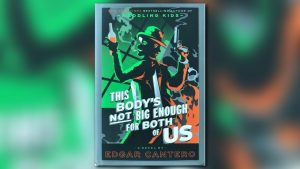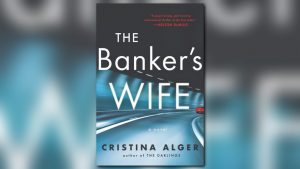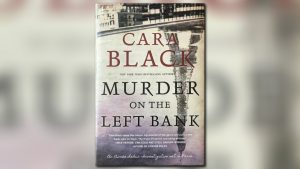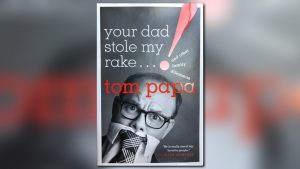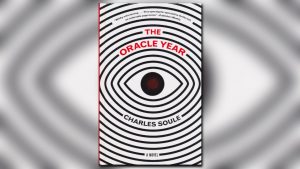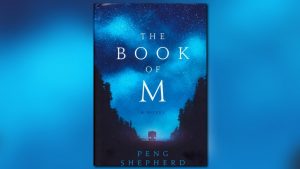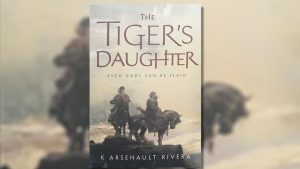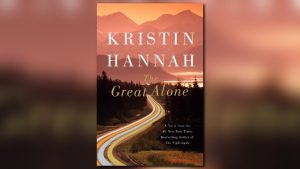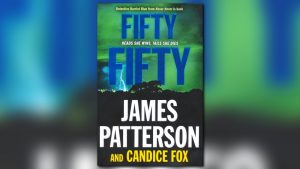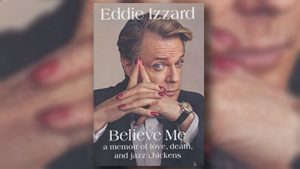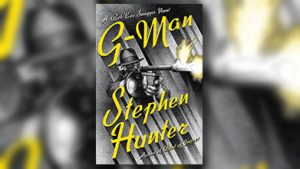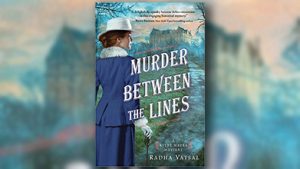“The Invention of Wings” is based on the true story of early-19th-century abolitionist and suffragist Sarah Grimké.
The novel takes that reader through the struggles of Sarah Grimké due to her controversial actions and decisions.
In the early 1830s, Sarah and her sister Angelina were the most infamous women in the United States.
They spoke openly in favor of liberty and equality for African-American slaves and women.
They rebelled against society, religion and their family, and were under threat of death in Charleston, South Carolina.
Sue Monk Kidd trades chapters between their voices across decades, imagining the Grimké sisters’ courageous metamorphosis and, gives Hetty, a handmaid given to Sarah when she was young who later died, her own life of struggle and transformation.
VOICEOVER: Books and company is made possible by the Virginia G. Piper center for creative writing, serving writers and readers in the Phoenix metro area, the State of Arizona, and the world.
ALBERTO RIOS: Welcome to books and company. Bienvenidos todos. I'm your host Alberto Rios. We're joined today by Sue Monk Kidd, who will be talking about her most recent novel, "The Invention of Wings". Published by Viking. Welcome, Sue.
SUE MONK KIDD: Thank you for having me.
ALBERTO RIOS: This is a pleasure, and I know that we'll have a lot of viewers who are going to be very interested in what you have got to say. You come to this book with a lot of history, but this is your first historical attempt. Can you talk a bit about what brought you to the book and, and maybe about the Grimké sisters, themselves? Am I pronouncing that right, the Grimké sisters?
SUE MONK KIDD: Yes, that is how they say it in Charleston, so that's how we'll say it, Grimke. I didn't know, I don't know about them until 2007, and even though I was living in Charleston, where they were born. And I went to the Brooklyn museum, and, to see the Judy Chicago dinner party exhibit, and I found their names on the heritage panels.
ALBERTO RIOS: You found their names, in Brooklyn.
SUE MONK KIDD: Yes. Ironic
ALBERTO RIOS: Ironic.
ALBERTO RIOS: That's nice.
SUE MONK KIDD: So, I left Charleston, which is their home, and went to Brooklyn, and there they were and, and they -- I discovered that they were the first female abolition agents in America, official ones.
SUE MONK KIDD: And, and some of the earliest feminist they are pioneers for women's rights and yet they were virtually unheard of, in the popular culture, I think in academia, they are probably well-known.
ALBERTO RIOS: This is Sarah and her younger sister, Angelina Grimke.
SUE MONK KIDD: Yes.
ALBERTO RIOS: And they are, they are historical figures -- I don't know that even academia knows their names with any familiarity. I had to look it up, too, and was both shocked and awed at what they had accomplished, and this book is largely their story.
SUE MONK KIDD: Yes. I wanted to tell their story because it has fallen through some kind of little crack, in American history, and they deserve to be known, they were extraordinary women, and I think what moved me about them, after I discovered them, in New York, was how, how, how much that they had to overcome to do what they did. They had to give up, really, break away from, from their home, their family, their religion, their culture and traditions and, and they became exiled in Charleston, and they became pariahs, and they had to flee to the north, and in order to accomplish this great destiny that they had.
ALBERTO RIOS: This was the early 1800s to mid-1800s or so.
SUE MONK KIDD: That’s right.
ALBERTO RIOS: This seems impossible. Both of them would do this.
SUE MONK KIDD: Well, think about it. I mean, you have got two southern women from Charleston who are steeped in that time and place, and they belonged -- well, their family was a slave holding family, very wealthy, aristocratic family, at the top of the social hierarchy in Charleston, and yet, they threw it all over because of some moral compass in themselves, their own conscious and they, they became advocates, and abolitionists and, and that's quite extraordinary in the early 1800s.
ALBERTO RIOS: Will come to this a little later, but through that advocacy for abolishing they also became feminist and started to advocate what seem to me a little later in their lives for empowerment of women.
SUE MONK KIDD: They did they didn’t set out to do it that way, but what a lot of people don’t realize it, and I was one of them, is that is through that women in this country discovered their own oppression by fighting for the rights of others. So this is kind of historically true and so at that time Sarah and Angelina Grimke lit a spark in this country for women’s rights. They were out there fighting long before the Seneca Falls convention, which is where the women’s rights convention in 1848 was, they were out there fighting for women's rights to, to speak, in the public.
ALBERTO RIOS: It's an uneasy comparison, but it's an important one that, that women were being treated much like, and I don't mean to make easy, or a light comparison here, but, to, to -- what slaves were going through, and slaves had a very different experience. We'll address that. But, it's an interesting way to, to find a, a connection so that when they were speaking, the words they were saying seemed resonated for they, themselves.
SUE MONK KIDD: They recognized that they wanted to, to speak out against slavery, and yet, they were curtailed, and they were limited, vastly, in how and where they could do that. And they said give us the right to speak, and we can do so much more. And, and this, this, of course, created something of a controversy and split a huge backlash, and suddenly it was in the forefront of American life. Shall we give women the right to go out there and do this? And speak?
ALBERTO RIOS: Just basically speak.
SUE MONK KIDD: Yeah.
ALBERTO RIOS: It was that basic.
SUE MONK KIDD: Yes. In the public sphere. So, it was, I think, a boundary between women and the domestic world, and women coming out of that, into the public sphere and taking, having a political voice, a social voice, and it was a, I think, an interesting time for us, and we don't always see that amazing place in American life where that began and, and I called Sarah and Angelina, female incendiaries in the novel because they did really light a fuse.
ALBERTO RIOS: They lit a fuse and, and there was not an explosion, per se, except we know it's coming in the book. And we know what that's called, and it's war. But, it also suggests that, that the women's movement, itself, was a kind of battle. It was. It was intriguing to me that, even after they were relatively allowed to speak, then the question came up, could men come to, to their talks? And, and it just got so convoluted, and it seemed to, to, so crazy to us, but this was real life.
SUE MONK KIDD: And oh, yeah. You know, at that time, it's shocking to us, really, at that time, how limited women were, and what was going on, and this is one of the things that I hope to point out, the book was, was how far that we have come, and yet, through the lens of history, we can also see how much it matters, and how far we still have to go with so many things.
ALBERTO RIOS: If we can attach a global notion to that, too, that that was -- this is how it was in America. One can only imagine what it would have been like in places more oppressive and, and which may be continue that way today.
SUE MONK KIDD: Yeah. Exactly.
ALBERTO RIOS: This is the historical backdrop for the book. It's an important one. It's a great story, it's a heroic journey, but you find a way to tell this that I think is so intriguing. You have the -- let's call them true to life Grimke sisters, especially Sarah, but you have an inventive character, and you have two characters, two -- this is first person point of view, and you have two, two -- a main character but it's two characters. You have this same story, in essence, twice-told. You have the historical, things that we could check on, and then you have got the slave, and her narrative from the perspective of being a slave in the same household as this heroic woman. That makes her very human. Because we see a lot of gray areas. Talk to us about how, how you came up with, with this second main character.
SUE MONK KIDD: Once I knew that I wanted to write the story of Sarah Grimke, it was quickly, too, because I was so captivated by her. But I also knew immediately that I couldn't write the story unless I had an enslaved character. With weight and substance, that can go along with Sarah's and entwine their stories together. I wanted to show both worlds. It did not seem complete to just look at this time in history, which is a time of, of American slavery. And, and, and only talk about it from a white woman's perspective, Lynn's, and I felt that we had to get in the mind and heart of the enslave character as well, and, and so, I began to, to be daunted by that, and how was I going to pull that off. And then I discovered that, that there was actually an enslaved girl in the Grimke household given to Sarah as what they called a waiting mate.
ALBERTO RIOS: That's an extraordinary moment in the book and in that life that someone could be gifted over to someone else on, on, as a birthday present.
SUE MONK KIDD: This happened, I don't know how frequently, but it did happen where they were given as human presents for anniversaries or birthdays, and I don't know if the historical Sarah was actually giving this waiting mate but I concocted that scene because it had drama and power in this notion of bringing in an enslaved girl, and saying, here's your 11th birthday present.
ALBERTO RIOS: It's an evocative, compelling image, isn't it. Her name is Hedy, and her -- according to the -- her owners. Her mother has given her the name, Handful, which we have a lot of fun with. As I was reading this, I was thinking this is a weave. You are taking two characters, and you are weaving them, and the more that I thought about it, a weave is everything going in the same direction. Just intertwining, and there is a line from the book, which made me change my mind about this weave, and its handful talking to Sarah about everything in front of her, just spread out, like, like a Wilton carpet. And, and you use worpen-wuff, and I thought that they were at cross purposes but together, they are making a, an odd fabric so it's not everything going in the same direction, it's cross purposes and for this time, they are to go making this, this strong life called the south in the early 1800s, and I would not think that something at cross purposes could be useful, but, you give us the image of the carpet. And I think that it works, you know, pretty well. In doing that, though, you have to come up with almost two ways to speak English. Distinct from each other. And, and I want to ask you how, how do you go about, about speaking for, for somebody outside of your culture, for example and speaking, you know, the same language? That's always a difficult question to answer for writers, and you also have to, in some fashion, invent Sarah's language, too, which is, which is, which is white southern, and young woman, and, and in this time period. How did you go about finding those, those words, with, with accuracy and resonance?
SUE MONK KIDD: You are right, I did have to find two very distinct voices, I mean these were on opposite ends, in many ways, of their culture. And, and I read, a handful, Hedy Handful, I read a lot of slave narratives from the 19th century, and from the 1930s and, and I drew on memories of growing up in the south, and in Georgia.
ALBERTO RIOS: Ok.
SUE MONK KIDD: And, and African-American voices and, and but, ultimately, I have to say, her voice is her own. I cannot say where that voice really came from. All I know is that it was more accessible to me than I imagined. This was a great surprise to me, she had so much to say and she found a way of talking in my imagination. And I tried to give her free reign to talk, so her voice came a little easier to me than Sarah's.
ALBERTO RIOS: How intriguing. It's in dialect, in essence. But, it felt very smooth, and persuasive, and I am wondering, that's, that's a -- you could not invent that, you have to, to bring something to bear on a language like that.
SUE MONK KIDD: All I really knew is, is that, that Hanful's voice needed humor and irony, and I didn't want a heavy dialect. She did get in the book, she was literate and could read and write, and she spoke with the correct grammar, so it's easier on the reader's ears, but at the same time, she had to have her way of speaking that was authentic to the enslaved tongue. So, I think that it's slightly a mystery to me where the voice came from, to be honest, Sarah, on the other hand, her, her language was, was -- the actual Sarah, in 19th century, dialect, and piety, and I had to free her up to speak with a modern sensibility.
ALBERTO RIOS: Sure. I would like to take a moment to remind our viewers you are watching books and company. I am your host Alberto Rios, and we're joined today by Sue Monk Kidd, talking about her latest book, "The Invention of Wings." This idea of language, and what you had to free Sarah of in order to let her speak, the, the fighting against conventions here is right at the heart of everything. It is not just her upbringing in Charleston. She goes north. Sarah does and, and eventually, I don't want to give anything away out of the book but Sarah goes north for a period of time. And she eventually finds the Quakers, which seem to represent to her the things that she believes in. But they don't, ultimately -- and that's the irony in the book. They don't move fast enough. And she is a fireball. Can you talk a bit about that?
SUE MONK KIDD: Yes. Well, I have an enormous respect for the Quakers because they wrote the first anti-slavery document in our country.
ALBERTO RIOS: It's all in there. That's what was extraordinary. They had written it, and they had put it on paper, and they were preaching it.
SUE MONK KIDD: And that's what drew Sarah, and not only that, but they allowed female ministers, and this really just sort of knocks Sarah's socks of because that's what she wanted was a profession, a way to have a voice in the world. And, and they seemed to offer her this. The irony was that she became part of a more conservative element of the Quakers, and you know, the Quakers had these ideas, and yet, they were human beings and they were people of their time and culture, too, so sometimes, they would say yes, we are against slavery, but, not yet. Or we're not for immediatism, as it was calle, but the time has not come. Or they can be slow, does this ring bells?
ALBERTO RIOS: It does.
SUE MONK KIDD: In our political world.
Alberto Rios: St. Augustine, maybe a saint but not yet.
SUE MONK KIDD: I think that Sarah became often frustrated and even with her quest to become -- she wanted to become a female minister because this would give her a way to speak and be heard. She was impeded by that at every turn by the Quakers, and even Lacretia, one of the great pioneers and abolitionists in women's rights whose name we know more than Sarah's, she was a Quaker in that same meeting house with Sarah. And she left eventually to find a more liberal congregation. But Sarah became so, sort of stuck there, yeah. So yes, it was a conflicted experience for her.
ALBERTO RIOS: Well, she becomes a minister in the church of public opinion and, and extraordinarily so, the idea that, that she starts to, to speak openly, and her sister is a compliment to that, had to have been extraordinary in that time.
SUE MONK KIDD: Well, Angelina, her younger sister, was maybe even more of a fireball than Sarah, Sarah was, was -- really a deep they are, and she wrote the first, what you might call the comprehensive feminist manifesto that we have and, and, but, her sister was an orator, and Sarah said, you know, I am one wing, and Angelina is the other, and together they could really fly, and what they did was to break barriers.
ALBERTO RIOS: Which are resonant even now today. If we can relax away from the politics and all that. That kind -- those strictures for a moment, in the book itself, you give us imagery that's unforgettable, and you give us things to look for that, that we don't know that we should be looking for, but they are there, and there are some wonderful writerly moments, and you have a, a moment early on, for example, where you talk about handful spinning a globe in the master's library, and it squeaks terribly. And that, that one of the other slaves says that, that it sounds like the devil's toenail. 200 pages later, you have a moment in which the, the new person who runs the, the whole operation, little misses, she's standing on a fitting box, and it's turning in a circle. And, and Henful says it made me think of the old globe in the study the way it turned. You don't tell us it makes a terrible noise or that it's the devil's toenail. But, we get it. And you have built in enough into the wording that, that you give us throughout here, that later on you don't have to say everything. You have given us something that we, we apply to the narrative. Do you think that that's something that's just a writerly thing that writers do? Or were you hyperconscious of that?
SUE MONK KIDD: Probably somewhere in the middle of what you described. I think I write instinctively largely, and the imagery is so important to me, and it will return to me how to pull that thread very lightly, that image through the story. And in that moment, when I saw little misses on that box, turning, as we do when you are hemming a dress, you know, it made me think of that globe. It's their whole -- the whole world, that operated at the urban slavery, the family dine I can, the struggle for freedom, and everything suddenly seemed in that world that is spinning and spinning, and we know who is turning it. And, you know and, and I think that, and it is the devil's toenail. So, I think once I had that image, yes, it became a little more writerly. I could play with it, but it has to be done subtlety.
ALBERTO RIOS: You did it very well. And when I came to it, I thought that's great. It was a wonderful moment where I heard the noise without you telling me that I was hearing it. And I thought, isn't that what a great book does?
SUE MONK KIDD: Well, readers are very intelligent, and we don't have to spell everything out. They bring to it their own lens to read this book, or any book, and, and imagine, you want to ignite the readers, the readers' imagination, and that's part of the fun, is you get to connect the dots.
ALBERTO RIOS: You get to connect the dots, and you feel explicit in the making of something important. That's the gift you give to the reader, I think, you are saying, something about an important time, and, and in world history. And, and we are drawn into it by making those connections, I think that that's, that's a great job that you give to the reader, and one that, that I think readers accept willingly. You do a nice -- it's an inviting job. I was happy to do it as I was reading through it. One of the things that was striking to me, though, just going back to the personality now, the psychology of Sarah, just for a moment, she did not fit in anywhere. That was a painful thing to witness. She had terminal teenagerness where she seemed to have this, this red hair, freckles and different things, and she was so light, and she seemed not to have eyebrows, and she seemed ghostly. And she seemed almost not there, and, in that sense, and is that what it started with do you think? Was it just human nature, something -- we want to think of a great politics guiding all of this. But I think it starts somewhere else.
SUE MONK KIDD: Really, what, what compelled me so much about the sisters was, particularly Sarah, was the process inside of them. How in the world did they end up doing this? What was going on? What were the turning points? What were the dynamics? What were the heartaches? Because often great moments like Sarah's where she steps onto this public stage in America, starts with, in pain, or with loss, or with something in the human heart, and I think that that was true for her, and I mean, she was an odd child in many ways. She had a clear conscience about things that others didn't. Her mother called her my alien daughter. And she was shy. She mumbled her words. She just struggled to find her place of belonging, and she finally found it, though, and I think that this, this -- the invention of wings, the quest for both these main characters, it's about, about the quest for freedom, yes, two very different kinds of freedom. But, it's also about finding one's place in the world, one's voice. And articulating it.
ALBERTO RIOS: And I think that you said that well, it is too very different kinds of freedom. And I'm sure that there are many other kinds of versions of freedom that were in the mix, and we see them. One of the hardest things that forges her character, as well, is just righteous punishment, physical punishment of slaves. That can't help but affect the thinking of the human being, the caring human being, and the injury, all in the sake of the, it's for your own good or something like that, it was very difficult to read. And I think had this been a historical text, I'm not sure that I would have been able to find my way through it. But, to make a story out of that, to make consequences, evident, for us to follow those care, then, with that limp now, I thought that was, you know, an extraordinary thing and, and I don't know how you write about, about pain like that. And, and turn it into something.
SUE MONK KIDD: Well, there is something about taking moments like this, that are hard to bear, putting them into a story that, that makes them go down easier. And, and I think that, that that was an important way to do it, to offer a fully imagined story around American slavery. What it was really like inside. But, the extraordinary thing to me about, that I discovered writing this book was how invisible people at the time made slavery. That they didn't see it or they denied it or they somehow found a way to, to make this ok. And, and this, I think, is maybe the relevancy of, of historical fiction, is that it raises the question, you know, what's invisible to us today, and what -- how is evil gathering when no one is looking, and who is going to see it, and who is going to articulate it. So, that may be how it is relevant. But, yes, Sarah, at the time, was one who could see it gathering and not afterwards.
ALBERTO RIOS: And she lived through it, and that -- you give it to us, a story, and she makes an interesting statement at the end. I was not sorry for loving Charleston or for leaving it.
SUE MONK KIDD: Yes. Charleston is a wonderful city, you know. I lived there for many years. But, at that time, it was a different place.
ALBERTO RIOS: Yes.
SUE MONK KIDD: And that's the point.
ALBERTO RIOS: We want to thank you for joining us today. And thank you viewers, you've been watching Books and Company, I'm your host Alberto Rios, and we've been joined today by Sue Monk Kidd, talking about her most recent book, "The Invention of Wings." We hope you will join us again next time when we'll be bringing you another good book. Thank you.
SUE MONK KIDD: Thank you. Yeah. Wonderful.
VOICE OVER: Books and company is made possible by the Virginia G. Piper center for creative writing. Serving writers and readers in the Phoenix metropolitan area, the State of Arizona, and the world.








